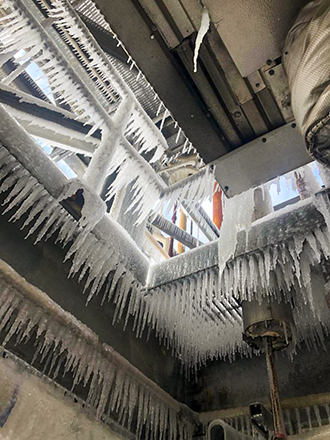FERC Nixes Trump-Era Grid Resilience Proceeding Amid Storm Probe

By Zack Hale
February 20, 2021 - The Federal Energy Regulatory Commission on Feb. 18 voted to end a long-running grid resilience proceeding initiated under the Trump administration, with one commissioner dissenting and three others issuing concurrences amid a historic Arctic storm that left millions of Texans without power.
During his first monthly open meeting as chairman, Richard Glick, a Democrat, argued that unprecedented grid outages initiated by the Southwest Power Pool, Midcontinent ISO and especially the Electric Reliability Council Of Texas Inc. had "nothing to do" with the move to close the resilience docket.

An Entergy Texas gas plant is shown covered in ice during a rare Arctic storm that has knocked out power for millions of people across the state.
Source: Entergy Texas
That Trump-era proceeding "grew out of a politically charged effort to prop up" coal and nuclear units "that were losing market share, which is simply not the way to ensure the resilience of the grid," Glick said.
Republican Commissioner Neil Chatterjee disagreed, however, arguing that the order terminating the docket "reasons that a comprehensive approach to grid resilience is not necessary."
"I continue to oppose a coal bailout in any way, shape, or form," Chatterjee said. "That is not what this proceeding is about."
'This matter has languished'
The resilience proceeding dates back to January 2018 when FERC unanimously rejected a proposal (RM18-1) by the U.S. Department of Energy to subsidize at-risk coal and nuclear plants capable of storing fuel on-site. At the time, a bipartisan complement of five commissioners all concluded that the record was insufficient to support additional payments to coal- and nuclear-fired generators facing heavy competition from renewable energy resources bidding into wholesale markets at prices reflecting zero marginal fuel costs.
However, in rejecting the DOE proposal Chairman Kevin McIntyre launched a separate proceeding (AD18-7) to evaluate the resilience of the bulk power system in the regions served by FERC-jurisdictional regional transmission organizations and independent system operators. Chatterjee assumed the chairman's seat when McIntyre died from a brain tumor a year later.
Despite calls for action by the now-deceased coal baron Bob Murray of Murray Energy Corp. and a coalition of coal-state lawmakers, the resilience docket has fallen dormant since the comment period closed in April 2018.
In explaining his vote to terminate the proceeding, Republican Commissioner James Danly noted during the meeting that the three-year-old resilience docket has "has languished here for as long as I've been at the commission."
"I think it's unlikely that even were the docket to remain live, that actual action would be taken on it," Danly said.
Democratic Commissioner Allison Clements joined Republican Commissioner Mark Christie in a separate concurrence arguing that a fresh start is needed.
"Procedurally, this matter has languished for more than three years with no action so the unavoidable conclusion is that these issues need to be shifted to other procedural vehicles to make progress," Christie said during the meeting.
In a subsequent statement to S&P Global Market Intelligence, Chatterjee pushed back on his fellow commissioners' characterizations.
"If the commission had the political courage to issue orders that set even-handed actions to define and gather cross-cutting information on resilience, we could have done so today," Chatterjee said. "Staff has done excellent work on this issue and I reject the notion that the proceeding has merely languished."
On a post-meeting press call with reporters, however, Glick argued that Chatterjee could have acted on grid resilience at any time during his tenure as chair.
"We're still going to consider the same issues that arose out of Texas, MISO, and SPP, but not under a docket that's been pretty much dormant without any discussion," Glick said.
Weatherization standards at center of inquiry
At the start of the Feb. 18 meeting, Glick spoke directly to an issue at the heart of the widespread blackouts afflicting the Texas grid: whether voluntary winterization standards like those recommended by FERC and the North American Electric Reliability Corp. following a similar cold snap in 2011 should be made mandatory.
"I'm prepared, if necessary, to support the imposition of new mandatory standards to make sure that electric generators and others are better prepared when extreme weather strikes the next time," Glick said during the meeting. "And there will be a next time."
To that end, FERC on Feb. 16 announced a joint inquiry with NERC into the operations of the bulk power system during this week's extreme cold weather events.
Asked about who should bear the cost of mandatory winterization standards, Glick told reporters that he would expect compliance costs to be reflected in generators' bids into ERCOT's energy-only market, which is known for sky-high scarcity pricing designed to ensure sufficient capacity.
ERCOT leaders noted during press calls this week that the grid operator's competitive market design does not incentivize generators to prepare for "once-in-a-generation" winter storms.
"As we saw this past week, whether it be coal, nuclear, gas, solar, wind, other technologies as well, they all were impacted," Glick said. "If there is some sort of weatherization standard, they would probably have to take some action and presumably they would have to pass those costs on in their bids."
Glick added that FERC will need to complete its joint investigation and issue a report before determining whether to open a new formal grid resilience proceeding.
"The inquiry is underway, then there's a report, and then we'll figure out whether to create a docket or not," Glick said.

